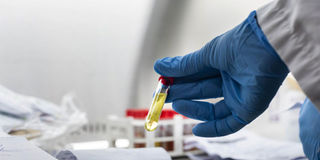Does Covid-19 cause hypertension?

UN Secretary-General Antonio Guterres warned Thursday that the world could be fighting the aftershocks of the Covid-19 pandemic for decades to come even if vaccines are quickly approved. Covid-related complications affect the body's immunity towards other diseases. PHOTO/AFP.
What you need to know:
- Health workers say some of the Covid-19 patients who had never presented with diabetic conditions and hypertension have experienced an increase in their sugar levels.
Diabetes and hypertension have emerged as some of the threatening underlying illnesses that leave Covid-19 patients at the risk of death because of their low immunity.
However, according to health workers, some of the Covid-19 patients who had never presented with diabetic conditions and hypertension have experienced an increase in their sugar levels.
A nurse at Entebbe Grade B hospital, who did not want to be named, told this newspaper recently that hyperglycemia has been noticed in Covid-19 patients who had never experienced high levels of sugar, especially on the fourth to 10th day.
“The reason is not known but I think Covid-19 has changed its way of attacking. I don’t know … they [scientists] are yet to prove what exactly happens after studies. After treating them [Covid patients], they stabilise, for us we do not know what happens next,” she said.
Although some people have attributed this condition to some of the drugs given to the Covid-19 patients, she said it has nothing to do with the drugs as some asymptomatic Covid-19 patients, who have been on just vitamins, experience the same issue of increased sugar levels.
According to American Diabetes Association website, hyperglycemia is the technical term for high blood glucose (blood sugar). High blood sugar happens when the body has too little insulin or when the body can’t use insulin properly.
Speaking at a function in Kampala recently, Dr Diana Atwine, the Permanent Secretary at the Ministry of Health, asked scientists to research about the insulin resistance and Covid-19 infection.
Dr Atwine said they cannot explain the sudden hyperglycemic state of the Covid-19 patients.
“We do not know whether it is just insulin dysfunction or it is over-reactive of insulin producing glands,…. that is something we have been urging our scientists to study,” Dr Atwine said.
Dr Atwine added that Covid-19 is now associated with high blood pressure and diabetes, which present even in patients who never had them.
Dr Misaki Wayengera, the head of the ministerial scientific advisory committee on Covid-19, told this newspaper last week that Covid-19 attacks the pancreas thus causing an infection known as acute pancreatic necrosis, which affects both the cells that produce insulin and cells that produce other enzymes for digestion.
Dr Wayengera added that in the same process, the adrenal cortex, a section of the adrenal gland, is damaged yet it produces glucocorticoids hormones that are involved in the regulation of blood sugars, which leads to insulin insufficiency.
“This is not as such insulin resistance but insufficient production of insulin that the pancreas does not do, but, of course, glucocorticoids hormones can lead to peripheral resistance with the little insulin there,” Dr Wayengera said.
According to hopkins-medicine, a medical website, adrenal cortex is the outer region and also the largest part of an adrenal gland.
The adrenal cortex produces hormones that controls sex, salt balance in the blood and sugar balance.
Dr Wayengera warned the people presenting diabetes and hypertension symptoms yet they don’t suffer from the conditions to do tests for Covid-19.
“One of the things we have realised is that it’s no longer just a result of exposure to the virus, it is part of the disease process and as such it, is a sign. When you find somebody who has never had diabetes suddenly developing diabetes, that should be a sign to tell you that the person could potentially have Covid-19,” he said.
However, he said the mechanism of hypertension is different as the virus attaches to receptors that are within blood vessels and the attachment of the virus there leads to vascular tension, which then leads to the rise in blood pressure.





